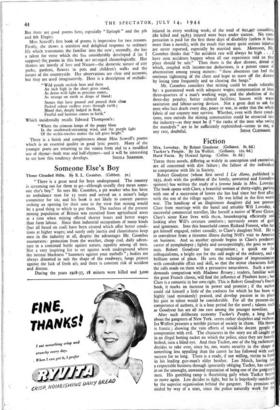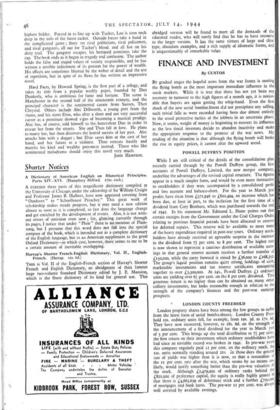• Fiction
Mrs. Loveday. By Robert Goodyear. (Gollancz. 8s. 6d.)
Tucker's People. By Ira Wolfert. (Gollandz. 12s. 6d.)
Hard Facts. By Howard Spring. (Collins. 8s. 6d.) THESE three novels, differing so widely in conception and execution, are all concerned with dire failure ; the failure of the individual to compromise with life in Society.
Robert Goodyear (whose first novel I Lie Alone, published in 1935, dealt with the problem of the lonely, unwanted and friendless spinster) has written the study of a femme fatale in Mrs. Loveday. The book opens with Clare, a beautiful woman of thirty-eight, parting with one of a succession of lovers she has had since her first affair with the son of the village squire. He was killed in the first world war. The handicap of an illegitimate daughter did not prevent Clare from marriage with the banal and amiable Will Loveday, a successful commercial traveller, like herself a native of Water Green. Clare's sister Kate lives with the.n, housekeeping efficiently and looking after Will's creature comforts ; nervously aware of guilt and ignorance. Into this household comes Richard Forrest, who has got himself engaged, rather casually, to Clare's daughter Nell. He is to convalesce from a tiresome illness during Nell's visit to America on business. And so another episode begins in Clare's predatory career of nympholepsy ; lightly and unsuspectingly, she goes to meet ruin. Robert Goodyear has imagination ; a quick ear for colloquialisms, a bright eye for the odd angle of the ordinary, and 3 brilliant sense of place. He uses the technique of impressionism with considerable effect and skill, so that the minor characters fulfil the calls made on them with a persuasive naturalness. Such a novel demands comparison with Madame Bovary ; readers, familiar with the great French classic, will find the influence of Flaubert here ; but Clare is a romantic in her own right. This is Robert Goodyear's fourth book, it marks an increase in power and promise ; if the author could rid himself a little of the coolness for which he has been SO highly (and mistakenly) praised, and develop passion in its place his gain in talent would be considerable. For all the present-clay competence of authors, it is a lean period for the novel ; talents such as Goodyear has are all too rare among the younger novelists.
After such deliberate economy Tucker's People, a long book about the gangsters of New York. seems rather shapeless and verbose
Ira Wolfert presents a terrible picture of society in chaos. His theme is frantic ; showing the vain efforts of would-be decent people (0 compromise with evil. The characters in the story are all caught up in an illegal betting racket on which the police, since they are heavily
bribed, turn a blind eye. And then Tucker, one of the big racketeers, decides to take over, since he, too, wants security in the shape of something less appalling than the career he has followed with such success for so long. There is a ready, if not willing, victim to hand in his leading gun-man's elder brother. Leo Minch, having lost a respectable business through ignorantly obliging Tucker, has cashed in on the unsought, unwanted reputation of being one of the gangster 5 men. His gambling ramp is flourishing gaily when Tucker begals to move again. Leo decides to fight, but he is hopelessly outclassel by the superior organisation behind the gangster. His premises are raided by way of a start, since the police naturally work for ttl:
highest bidder. Forced in to line up with Tucker, Leo is soon neck deep in the toils of the latest racket. Outside forces take a hand in the complicated game ; there are rival politicians, rival policemen, and rival gangsters, all out for Tucker's blood, and all hot on his dirty trail. The gangster escapes, his betrayed associates take the rap. The book ends as it began in tragedy and confusion. The author holds the false and stupid values of society responsible, and he has written a terrible indictment of its passion for the power of wealth. His effects are sometimes blurred by the welter of detail and the use of repetition, but in spite of its flaws he has written an impressive novel
Hard Facts, by Howard Spring, is the first part of a trilogy, and takes its title from a popular weekly paper, founded by Dan Dunkerly, who is ambitious for fame and fortune. The scene is Manchester in the second half of the nineteenth century, and the principal character is the sentimental curate from Sussex, Theo Chrystal. Others include Alec Dillworth, a young poet from the slums, and his sister Elsie, who after a short and not very successful career as a prostitute showed signs of becoming a musical prodigy. Alec has, of course, sold himself to the..benevolent Dan in order to rescue her from the streets. She and Theo fall in love. He plans to marry her, but then discovers the horrid secrets of her past. Alec attacks him with a dagger ; but Elsie saves *dm at the cost of her hand, and her future as a violinist. Theo retreats hastily and marries his kind and wealthy patroness instead. Those who like sentimental melodrama should enjoy this novel very much.
JOHN HAMPSON.



























 Previous page
Previous page